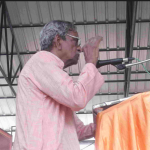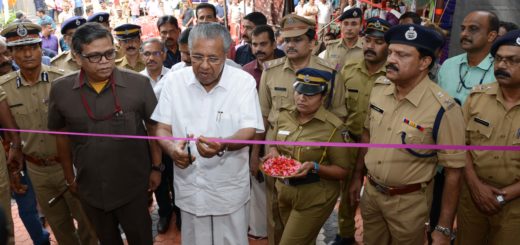Nirbhaya’ became judges after 5 years ‘Brutal, barbaric, diabolic’: SC upholds death for convicts in 2012 gang rape

 (Note: Nirbhaya died in Delhi in 2012 as a victim of gang rape now so common in India. It took nearly five years for courts in India and its Judges to climb to the heights of ‘Nirbhaya’ (fearlessness) to hand out the harshest penalty to the worst of gang rape that took place in India. Actually there were 6 involved in this crime. The main culprit committed suicide in Tihar jail and another escaped conviction for being juvenile.
(Note: Nirbhaya died in Delhi in 2012 as a victim of gang rape now so common in India. It took nearly five years for courts in India and its Judges to climb to the heights of ‘Nirbhaya’ (fearlessness) to hand out the harshest penalty to the worst of gang rape that took place in India. Actually there were 6 involved in this crime. The main culprit committed suicide in Tihar jail and another escaped conviction for being juvenile.
But don’t be mistaken, we, the CCV, are totally opposed to death penalty for any criminal. One of the core ingredients of punishment is that it should serve also as a corrective measure. A dead person cannot be corrected. But even the hardest criminals can be corrected as long as they are alive. That is why most of the civilized countries in the world have given up death penalty. Is not India civilized yet to join this club of modern civilized nations?
Therefore what is advisable is to give life long (till death) imprisonment to such criminals while making it compulsory to undergo educational programmes like listening to exemplary life stories and providing similar books for compulsory reading. If and when some of these hardened criminals get reformed, they could be released for some testing time under proper supervision and later permanently. The principle is “Thou shalt not kill”.
What is reprehensible is the enormous time Indian courts take to settle any, even those in which it is too evident who the culprit is. It makes one believe that court cases have become a fertile and profitable business for lawyers and judges, forgetting “judgment delayed is judgment denied.”
We therefore can only hope that the present judgment will act as a strong deterrent for foolhardy youngsters to venture into the field of rape alone or as a gang. Our dailies are full of rape cases. According to national crime records bureau, in 2015, police registered more than 34,000 rape complaints and 84,000 women filed sexual harassment cases. During coming days can we hope to find fewer reports of Rape cases in our papers? james kottoor, editor).
The Supreme Court upheld on Friday the death sentence against four men convicted of gang-raping and killing a woman in Delhi in 2012, a crime that sparked national outrage and led to stringent laws against sexual violence against women in India.
Applause broke out in the packed courtroom after a three-judge bench threw out an appeal by the convicts, saying the “brutal, barbaric and diabolic” crime had generated a “tsunami of shock” in the society.
“Sympathy in any form would be misplaced and it would shake the confidence of public in the administration of criminal justice system,” said justice R Banumathi, upholding the death sentence given by a fast-track trial court and which was later reconfirmed by the Delhi high court.
Five men and a juvenile brutalised the 23-year-old trainee physiotherapist and her male friend in the back of a moving bus on December 16, 2012. The woman died of her injuries – her internal organs damaged with an iron rod — nearly two weeks later in a Singapore hospital.
Four years ago, one of the convicts was found hanging in his prison cell. The juvenile, who was months away from turning 18, was released from a reformative home last year.
“The casual manner with which she was treated and the devilish manner in which they played with her identity and dignity is humanly inconceivable… These acts itself (themselves) demonstrate the mental perversion and inconceivable brutality (of the convicts),” read out Justice Dipak Misra, who led the bench.
The counsel for the convicts — Mukesh Singh (27), Pawan Gupta (20), Vinay Sharma (21) and Akshay Thakur (29) — said they would file a review petition.The court also dismissed the circumstances cited by the convicts, including their poverty, no criminal background, young age and post-crime reform.
“The accused may not be hardened criminals; but the cruel manner in which the gang rape was committed in the moving bus; iron rods were inserted in the private parts of the victim; and the coldness with which both the victims were thrown naked in cold wintry night of December, shocks the collective conscience of the society,” the bench said, recounting the torture the victim was subjected to.
Credible scientific evidence such as DNA profiling of the accused, victim and her friend – the complainant – was accepted and relied upon for the SC judgment. The court said medical reports have established that the bite marks on the victim’s body were that of the accused.
The defendants were not in court on Friday.The last recourse of the convicts, all of whom are now in their twenties, would be to seek clemency from President Pranab Mukherjee.
Applause broke out in court among relatives of the victim — whose identity is protected by law – and the people even before the judge completed reading the verdict.“I am very satisfied. Today I am happy,” the victim’s mother said outside the court house. Her father said: “It’s not just a victory for my family, it’s a victory for each and every woman in our country.”
The crime sparked large-scale protests and led thousands of women across India to break their silence over sexual violence that often goes unreported. It also shone a spotlight on what women’s groups call a rape epidemic in the country. In 2015, police registered more than 34,000 rape complaints and 84,000 women filed sexual harassment cases, according to the National Crime Records Bureau.
Authorities have stiffened penalties against sex crimes, introduced fast-track trials in rape cases and made stalking a crime. Despite the toughening of the laws, debate continues over whether they serve as a sufficient deterrent.
Opponents of capital punishment, however, argue that public and media pressure swayed the judges in the case to impose the death penalty, adding to the hundreds of already waiting on death row in India.
The last rapist to be executed in India was Dhananjoy Chatterjee, on August 14, 2004. He was hanged at the Alipore Central Jail in West Bengal, on his 42nd birthday, for raping and murdering a teenage girl.
















